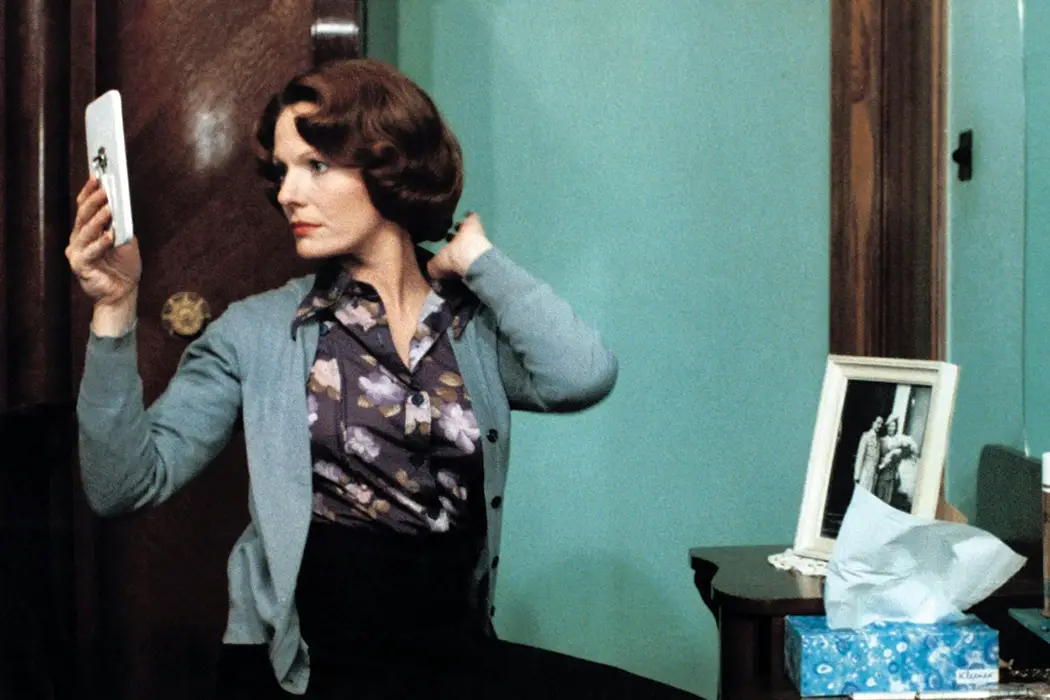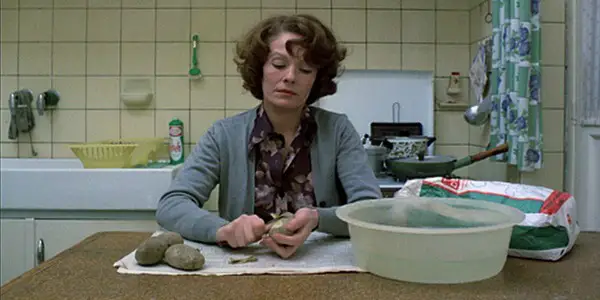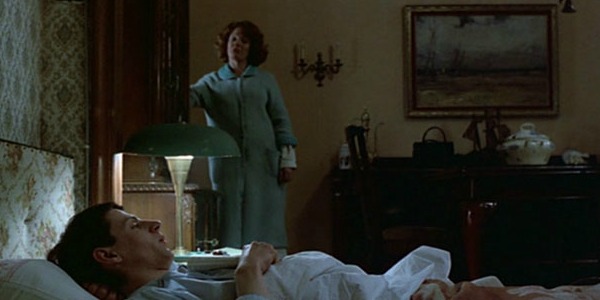JEANNE DIELMAN 23, QUAI DU COMMERCE 1080 BRUXELLES: Mystery & Insight In Everyday Work

Ben is a former student of cognitive science who is…
One of the latest films to grace us with a new Criterion Collection release is Chantal Akerman‘s masterpiece. It’s quite easy to see why, though the reason may be counter-intuitive to those who haven’t yet seen the film: the unexceptional nature of everything that happens in the movie makes it very easy to absorb countless other details.
The position of every object in the titular character’s apartment, the sounds of her daily activities, Delphine Seyrig‘s brilliantly inscrutable performance, the placement of the camera, and even the size of the frame all contribute to a picture of the most uncanny ambiguity.
The result is a film whose powers are vastly different from most of those you’re likely to see. It’s as austere as you’d expect a three-and-a-half-hour chronicle of daily routines to be, but for me is one of the easiest to watch out of all films of such length. This probably won’t be the case for everyone, but it’s clear that Jeanne Dielman has been more than effective for many. This is a film in which a character dropping a shoe brush can send a jolt of genuine discomfort up your spine. If you ask me, there’s little one could say that would better attest to a film’s excellence.
Everyday Power
Jeanne Dielman 23, Quai du Commerce 1080 Bruxelles follows a woman called Jeanne Dielman over the course of three days. Each day she cooks, cleans, bathes, tends to her hair, does errands, visits a local coffee shop, and accepts one client who pays her for sex. When her son comes home, they eat dinner together and converse briefly. These dinners are the film’s talkiest scenes; most of it proceeds without dialogue.
This routine is repeated in a way that suggests absolutely nothing extraordinary until the very end of Jeanne Dielman. The one element of the story from which you might expect intrigue is that she offers sex in exchange for money, and that’s portrayed as wholly transactional; you soon find it’s as much of a banality as everything else in the film. Even so, you can sense that something is amiss – and not only amiss, but potentially building to something drastic – long before Jeanne ever breaks from her routine. Part of the reason for this is how that routine is portrayed in Jeanne Dielman‘s first act, before anything goes wrong. Jeanne’s home is a perfectly composed space, and we see that her routine plays a major role in that.

Throughout the first segment of Jeanne Dielman – the first day during which we accompany Jeanne in her everyday activities – her cooking, cleaning, and rearranging disrupt her home’s perfect composition, but when she’s finished, she sets everything back in place. The only exception is a barely visible reflection of flashing light on the wall of Jeanne’s apartment, coming from some unknown source out the window. Besides that, we come to realize that everything in her apartment needs to be maintained. We see the work it takes to manage a home, and the efficiency with which Jeanne carries out that work.
That probably sounds prosaic, but it’s actually rather satisfying to watch concrete results arise from a series of carefully executed steps. Jeanne gains a certain stature in the viewer’s eyes: Jeanne Dielman‘s world may be small but Jeanne is in complete control of it. We may sometimes hear background characters talking or even complaining directly to Jeanne about their day, but she appears to remain detached, floating above their problems. At some points, when she shares the frame with her son, she towers over him and stands in a place where she can see him but he cannot see her. When they speak, their dialogue makes it apparent that she never shares more with him than she wants to.
Moreover, the camera rarely if ever moves, is somewhat low to the ground, and is fairly distant from whatever action is taking place on the screen. Also, that action extends beyond what we’re allowed to see: as we watch Jeanne perform housework, she often walks in and out of the frame freely, occupying a world larger than what our vision contains. She isn’t subject to the same constraints as we are.
But, that doesn’t mean she isn’t constrained in other ways.
It All Comes Tumbling Down
The constraints placed on viewers arise from the impression that there are always aspects of the film’s world which are beyond our sight, and how we see the bits of it that aren’t. It’s still worth noting, however, what we can see. The camera doesn’t follow Jeanne because it lingers on processes rather than characters. The disconnect in this film is not that Jeanne is unconstrained and the viewers aren’t; rather, both are constrained by the fact that the camera’s indifferent to things other than the carrying out of quotidian tasks and habits.
While Jeanne Dielman gives us a sense that its world extends beyond the frame, it also reduces that world by giving primacy to work that doesn’t seem to have any greater end than keeping everything in place. Even social interactions seem like little more than going through the motions, because of Jeanne’s detached demeanor. There are a few moments in the film in which Jeanne takes a break, and these are some of the only ones in which Seyrig emotes with a lesser degree of ambiguity. In the only moments where it would seem she has nothing to worry about, she appears concerned, or maybe even frustrated.
This might portend the later parts of Jeanne Dielman: near the end of the second day, something changes. It’s not perfectly clear what it is, but it’s implied to have to do with the client she takes on the second day. It begins when we notice her hair and demeanor are subtly different from after her meeting with the client of the first day. But these are only the first two constants to be altered. Her mannerisms change slightly. She begins to make mistakes in her rigorous routine. The mistakes are never more than slight; she overcooks some potatoes, she drops a brush, she forgets to put the lid back on an open container. But despite how minor these errors are, they’re truly disturbing; the first parts of the film are just so downright persuasive, on a visceral level, of Jeanne’s deadly efficiency. By this point, we’re familiar with the details of Jeanne’s environment and the work it takes to maintain them, so we understand how small blips can carry larger potential.

Jeanne tells her son that she always wanted to manage a household and raise a child, and that she doesn’t care whether a husband or anyone else helps her do it. She’s about as self-sufficient as you could expect someone in her circumstances to be. And yet, in many scenes, the composed, insular space of her home is still disrupted from the outside: we can see a faint reflection of flashing light on the walls of Jeanne’s house, coming from some unknown, never-seen source shining through her window and just barely, intangibly altering the otherwise perfectly controlled aesthetic of Jeanne’s home.
We can’t know what Jeanne is thinking, but we can recognize that she’s entered into a situation where the means by which she sustains her life has come into conflict with the lifestyle she puts so much work into organizing for herself. We can understand that it’s a lifestyle build around being in control of her environment, and in turn understand why it upsets her, at least a little, for cracks to form in it.
We can also perceive her attempts to regain control. When she goes shopping on the third day, she shares personal stories with the people she does business with, in contrast with the detached silence with which she approached them on the second day; she inserts more of herself into her interactions with others.
Is all this because of a misguided faith in self-sufficiency? Is it because of whatever circumstances led to the life Jeanne leads in Jeanne Dielman? Maybe it’s that cultural processes have led the characters to perceive the world in an unhealthy way. Jeanne Dielman 23, Quai du Commerce is an ambiguous film in a way few films are: it is not equivocating or developing different sides of an argument, but creating a sense of life and gravitas that stimulates the viewer’s curiosity and starts them thinking along a potentially infinite number of different paths.
The ending builds on this. Without giving too much away: it’s a final, decisive blow involving a genuinely outrageous assertion of will. Where Jeanne Dielman‘s ambiguity leaves us with the impression that it’s dealing with incredibly complex problems and concepts, the ending leaves us with a stark reminder that such problems have real consequences, and that their complexity is an obstacle to solving them that needs to be taken dead seriously.
To Conclude
It probably goes without saying that a movie of such prodigious length and austerity is not for everyone. It wouldn’t be the first movie I’d recommend to someone, though it is arguably more accessible than Chantal Akerman‘s other work, and a fine testament to her brilliance. According to the film critic Ben Sachs, one of the most subversive things a film can do is show characters at work. Jeanne Dielman 23, Quai du Commerce 1080 Bruxelles exemplifies this method of subversion in a very pure sense, using its depictions of work to subvert any impression of stasis or necessity you might have about the world: you see not only that everything comes into place through process, but also that they need to be maintained in place. Three and a half hours is longer than average for a movie, but the histories this film hints at, even behind the simplest things, spans far more time than that.
And for what it’s worth, it’s an easier watch than you might think – at least, I thought so. This film’s voice comes through in the emotions and intuitive reactions it effects. If you like, it need not be a cerebral exercise so much as an exploration of the ways a film can reach an audience. Again, it’s not the first movie I would recommend to someone, but anyone who thinks it might be for them should make it a priority.
Do you feel any other films say something through the depiction of work?
Jeanne Dielman 23, Quai du Commerce 1080 Bruxelles was originally released on May 14, 1975. A Blu-ray edition was released by the Criterion Collection on May 9, 2017. It is also available for streaming on Filmstruck.
Does content like this matter to you?
Become a Member and support film journalism. Unlock access to all of Film Inquiry`s great articles. Join a community of like-minded readers who are passionate about cinema - get access to our private members Network, give back to independent filmmakers, and more.
Ben is a former student of cognitive science who is currently trying to improve his writing style and ability to understand and appreciate films containing unfamiliar perspectives. He tries not to hold films to a strict set of criteria, but does believe that strong movies can change your outlook on the world. His favorite films include Whisper of the Heart, Hellzapoppin', Foolish Wives, 42nd Street, and the work of Charlie Chaplin.













